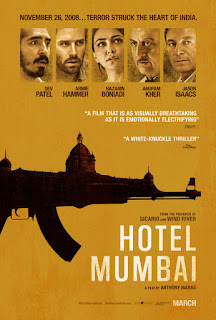☆☆☆☆
There are times when Hotel Mumbai is almost too excruciating to watch, and others when it seems uncomfortably to be playing a horrifying real-life terrorist attack for entertainment. There's a fine line between dramatization and exploitation and Hotel Mumbai stays on the right side of the line ... barely.
Director Anthony Maras makes his feature film debut with this film, and he's a director to watch: Hotel Mumbai generates genuine suspense despite a pre-ordained outcome; is filled with actors who manage to deliver real and jolting performances; and always keeps its audience riveted. The latter is a considerable achievement because Hotel Mumbai is harrowing, brutal and almost sadistically intense.
Maras and co-writer John Collee sometimes bring just a hair too much '70s disaster movie tone to Hotel Mumbai, particularly in the introductory scenes, when we meet characters like the earnest young steward (Dev Patel), the wealthy Americans (Armie Hammer, Nazanin Bodiadi), the dedicated chef (Anupam Kher), and the sleazy Russian (Jason Isaacs). Still, the approach does find important humanity amid the horror, as they all are inside Mumbai's Taj Hotel on Nov. 26, 2008, when a group of terrorists lay brutal siege to the landmark and to the city.
Hotel Mumbai is not a movie to watch as much as it is a movie to witness. If it feels too much to bear at times, that speaks to the creative achievement of its filmmakers -- and, perhaps, to the unfathomable brutality of the times in which we live.
Viewed March 31, 2019 -- AMC Sunset 5
1600
Director Anthony Maras makes his feature film debut with this film, and he's a director to watch: Hotel Mumbai generates genuine suspense despite a pre-ordained outcome; is filled with actors who manage to deliver real and jolting performances; and always keeps its audience riveted. The latter is a considerable achievement because Hotel Mumbai is harrowing, brutal and almost sadistically intense.
Maras and co-writer John Collee sometimes bring just a hair too much '70s disaster movie tone to Hotel Mumbai, particularly in the introductory scenes, when we meet characters like the earnest young steward (Dev Patel), the wealthy Americans (Armie Hammer, Nazanin Bodiadi), the dedicated chef (Anupam Kher), and the sleazy Russian (Jason Isaacs). Still, the approach does find important humanity amid the horror, as they all are inside Mumbai's Taj Hotel on Nov. 26, 2008, when a group of terrorists lay brutal siege to the landmark and to the city.
Hotel Mumbai is not a movie to watch as much as it is a movie to witness. If it feels too much to bear at times, that speaks to the creative achievement of its filmmakers -- and, perhaps, to the unfathomable brutality of the times in which we live.
Viewed March 31, 2019 -- AMC Sunset 5
1600




